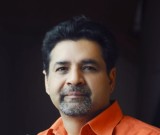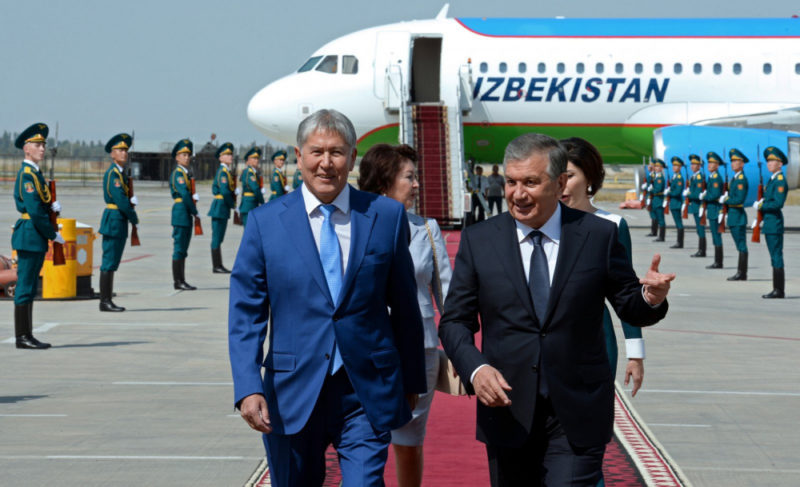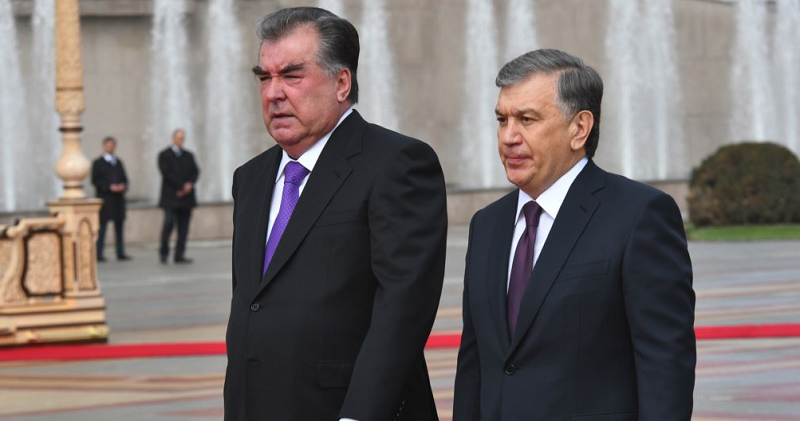
By Agha Iqrar Haroon
Uzbekistan had been playing effective role in international diplomacy since it took independence from former Soviet Union. However, Uzbek Diplomacy opted policy of “Isolation” if we talk about its relations with neighbouring Kyrgyzstan and Tajikistan during the last two decades.
Coming out of diplomatic cocoon it made for neighbouring countries; Uzbekistan under President Shavkat Mirziyoyev did not feel shy to visit neighbouring Kyrgyzstan and Tajikistan while forgetting egoistic approach of “Who will visit whom first?”
Uzbekistan is much larger than Kyrgyzstan and Tajikistan by land, economy and resources but President Mirziyoyev decided to visit his neighbours first before inviting them to home. In September 2017, President Mirziyoyev went to Kyrygzstan — a visit of any Uzbek President to Bishkek after a pause of 17 years. It is pertinent to mention that late Uzbek President Islam Karimov held last visit to Bishkek in year 2000.

One can see that Uzbek diplomacy followed isolationism defined foreign policy and former President Karimov became more “protectionist” and extra conscious with passage of time while dealing with neighbours as well as with Russia and NATO members.
Bordering radicalized and burning Afghanistan and civil-war beaten Tajikistan, Karimov apparently avoided close relations with anybody around him except Kazakhstan. He had been suspicious about Kyrgyzstan due to extraordinary interest of United States in Bishkek and “Colour Revolutions” which were allegedly sponsored by western powers. He was also suspicious about increasing Russian interest in former Soviet states. One should understand his reservations in a situation where Islamists tried to kill him and tried to bring Jihad from bordering Afghanistan into Uzbekistan. One can justify his “Closed-door Diplomacy” during early 90s and then in first decade of 21st century due Jihad spree and “Operation Enduring Freedom” in Afghanistan, civil war in Tajikistan and rise of Russian influence and economy after the death of Soviet Union. His protectionist approach kept his country away from negative impacts other regional countries faced like radicalization in Pakistan and fight for pitching Islamic states in Afghanistan and Tajikistan. His policy also enabled his country to achieve an extra ordinary economic growth of over 8 % and stabilization of Uzbek economy within first 20 years of independence.
Death of President Karimov brought his Prime Minister Shavkat Mirziyoyev into power after Presidential elections of 2016. Shavkat Mirziyoyev had been dealing with state affairs as governor (Hakim) of Jizzakh Region from 1996 to September 2001, then as governor of Samarqand Region from September 2001 until his appointment as Prime Minister in 2003. Shavkat Mirziyoyev understood opportunities and threats being faced by his country and he consolidated Uzbek economy with policy of free flow of currency after assuming power as new President and started working to opening country slowly but surely while rechecking results of new policy.
Uzbekistan had a number of disputes with neighbouring Kyrgyzstan and Tajikistan which were hampering diplomatic relations since independence of former SSRs neighbours. Being a country having strongest Army and Air Force in Central Asia, Uzbekistan did not care to resolve water and land disputes with neighbouring countries unless Tashkent decided to become peacemaker in Central Asia under the leadership of Shavkat Mirziyoyev when he announced his visit to Kyrgyzstan in year 2017. Uzbek President Shavkat Mirziyoyev visited Kyrgyz capital, Bishkek for two days on September 5, 2017 and Kyrgyz the then President Almazbek Atambayev called the visit of President Mirziyoev a “historic event for both nations.”
The then President Almazbek Atambayev during his meeting with President Mirziyoev said that both the Kyrgyz and Uzbek people have (had) been waiting for this visit for more than 20 years. His visit to Bishkek was a great breakthrough for bilateral relations of Kyrgyzstan and Uzbekistan and several agreements were signed, including a pact on the demarcation of more than 80 percent of the countries’ long and tortuous border. Uzbekistan is the most populous of the five Central Asia’s nations, with about 32 million people while Kyrgyzstan has a population of about six million, including a large ethnic Uzbek minority concentrated in southern regions near the border. Now Uzbek-Kyrgyz border crossings are friendly for international tourists and thousands of international tourists prefer to travel between the two countries by land and that is helping meager Kyrgyz economy to get a substantial share from Central Asian tourism.
After a successful rapprochement with Kyrgyzstan, President Mirziyoev started work to normalize relations with Tajikistan and his March 8 visit to Dushanbe wrote a new chapter of diplomatic relations between the two countries.
President Mirziyoev was received by President Emomali Rahmon at airport and motorcade proceeded along the protocol route to the Kasri Millat Palace, and was greeted by 12,000 students and schoolchildren standing by the roadside with the flags of Uzbekistan and flowers. Nobody could imagine this scene in Dushanbe just two year ago when Uzbekistan was considered as an “arrogant neighbour”.

Now President Shavkat Mirziyoyev and President Emomali Rahmon are discussing a common future of Tajikistan and Uzbekistan and shared opportunities Bishkek and Tashkent can enjoy. Bilateral economy is their priority and both presidents decided to work together for expanding trade and economic cooperation. Visa regime has been softening and now citizens of two neighboring states can be on the territory of each other for 30 days without any permits. As many as 27 documents had been signed aimed at further strengthening cooperation in the areas of trade, economy, investment, finance, transport and transit, agriculture, water and energy, taxes, customs, tourism, education and science, health, culture, interregional cooperation, in the field of security and combating crime.
Central Asia is entering into a new era of cooperation and Shanghai Cooperation Organisation (SCO) member states can really take benefit from emerging Eurasia because cordial bilateral relations among Tajikistan, Uzbekistan and Kyrgyzstan had been a dream for international firms interesting to invest in tourism sector of Central Asia and tour operators in past. Now dream is becoming a reality and economies of three countries can benefit each other without any iota of doubts.
Should we not appreciate President Shavkat Mirziyoyev for snubbing egoism that was hampering peace of Central Asia since ages?
